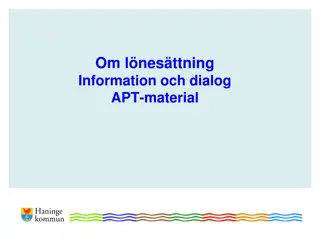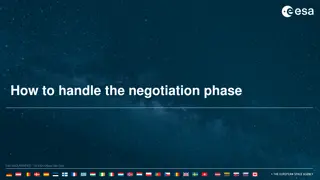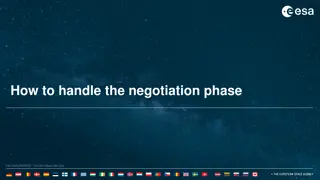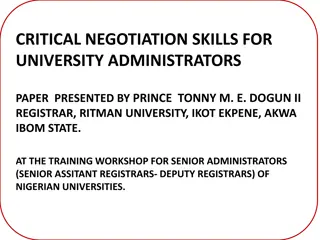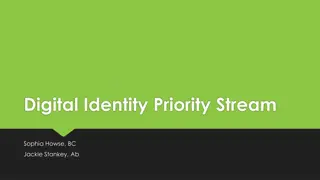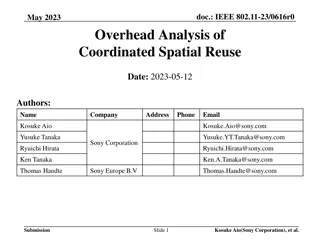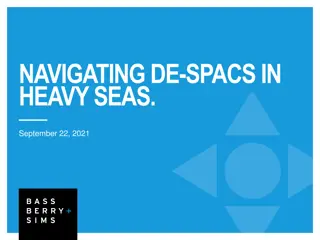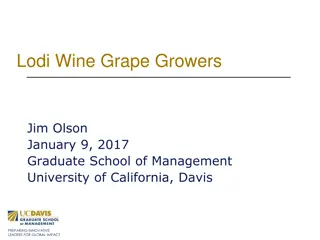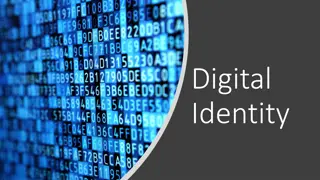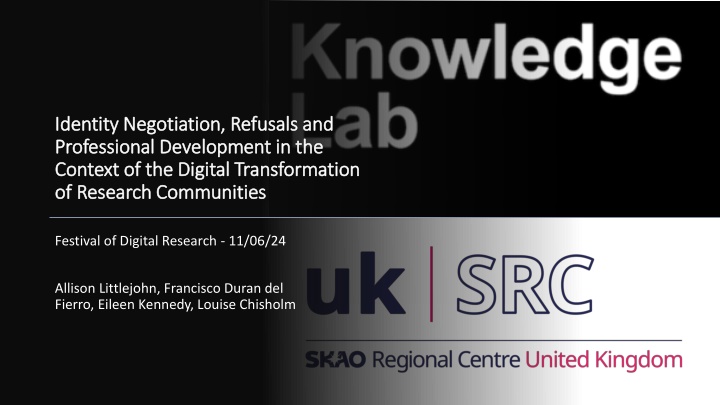
Identity Negotiation and Professional Development in Digital Research Communities
Digital transformation is reshaping research culture and systems, with a focus on identity negotiation, refusals, and professional development in research communities. Policy and institutional efforts are addressing changes in research practices like data sharing through solutions from the system and culture. Emphasis is placed on people, culture, and the environment to promote research integrity.
Download Presentation

Please find below an Image/Link to download the presentation.
The content on the website is provided AS IS for your information and personal use only. It may not be sold, licensed, or shared on other websites without obtaining consent from the author. If you encounter any issues during the download, it is possible that the publisher has removed the file from their server.
You are allowed to download the files provided on this website for personal or commercial use, subject to the condition that they are used lawfully. All files are the property of their respective owners.
The content on the website is provided AS IS for your information and personal use only. It may not be sold, licensed, or shared on other websites without obtaining consent from the author.
E N D
Presentation Transcript
Identity Negotiation, Refusals and Identity Negotiation, Refusals and Professional Development in the Professional Development in the Context of the Digital Transformation Context of the Digital Transformation of Research Communities of Research Communities Festival of Digital Research - 11/06/24 Allison Littlejohn, Francisco Duran del Fierro, Eileen Kennedy, Louise Chisholm
Context: digital transformation of research communities Outline Outline Our approach: rethinking 'research culture' and 'the system'
Context Context
Context: digital transformation of research Context: digital transformation of research communities communities Massive investment in UK Digital Research Infrastructure oThe UK is set to reach a Government R&D budget of 20 billion a year by 2024/5 The rapid growth and use of Artificial Intelligence in science The FAIR Data Accelerator project is one of the pilot projects for the DSIT/UKRI Research Data Cloud Pilot Commission which are testing the need for a national research cloud through a series of interventions designed to remove data sharing barriers Research is changing from the core to the periphery, impacting: oResearchers (behaviours and values) oResearch culture (e.g., data sharing practices)
Policy and institutional efforts to tackle changes in Policy and institutional efforts to tackle changes in research practices (e.g., data sharing) research practices (e.g., data sharing) Policy and institutional efforts have alternated between focusing on solutions from the system and/or research culture. Solutions from the System: open-science mandates, guidelines, FAIR standards, data sharing platforms, incentives, new technologies, etc. Solutions from the Culture: individual behaviour and values (codes of conduct). Initiatives have an educational and informational purpose: resources (32%), training (28%) and studies (27%). Certain collaborative initiatives are also common, namely networks (25%) and workshops (21%). Initiatives often target early career researchers, gender and ethnic minorities (Research Culture Initiatives in the UK 2024)
Emphasis on People, Culture and Environment https://ukrio.org/ research- integrity/what-is- research- integrity/
Our approach Our approach
Introducing key social science concepts Introducing key social science concepts New technologies and practices Identity renegotiation Agency - refusals Affective dimension (fears and concerns) Epistemic virtues or technomoral dispositions
Our approach: agency mediates the relationship between Our approach: agency mediates the relationship between researchers and the world researchers and the world Non-human agency: technologies (HPC, Storage, AI, etc.) World (nature, society, universe, etc.) Researchers Human agency: individual and collective identity negotiation / refusals
Identity negotiation: the fact that something of oneself or one's identity has to be sacrificed in order to allow a new configuration to grow out and to make sense of the problem of the previous practice Our approach Our approach Refusals: our relationship with ourselves and others may be altered by the implementation of policies and codes of conduct, which involve various forms of accommodation to, ambivalence towards, and resistance.
we recognise Research the conflictual aspect of research culture ('conflictual consensus'), where agreements based on universally valid principles are hardly possible. Culture: Our approach Our approach This means that changes in research culture depend on identity negotiation/refusals, which are mobilised by an affective dimension (fears and concerns), epistemic virtues, and technomoral dispositions.
Our approach Our approach Attending to these dimensions is necessary to recognise that digital transformation of research communities extends beyond technical issues This focus provides insights to explore what researchers need to cultivate and what community values need to be established to create Research Cultures
Methods: Co Methods: Co- -laborative laborative Ethnography Ethnography An interdisciplinary approach merging sociology, educational research, and digital research infrastructure expertise to identify social and cultural challenges and offer support to communities when research culture changes. We combine two methods using a 'Co-laborative ethnography' approach (Niew hner 2016): digital ethnography (scoping conversations, online interviews and participant observation) and participatory co-design of professional development (group discussions, practical design activities) Co-laborative ethnography: reflexivity is distributed among key actors (researchers and participants) We use insights from ethnography to support research communities and inform science policy
Professional development: co Professional development: co- -design design The co-design of professional development activities/interventions that goes beyond knowledge and skills This co-design is based on a framework that includes: 1. Social and cultural challenges identity / refusals (the past and the present the culture) 2. Existing activities supporting researchers (the past and the present the system) 3. Suggestions to address these challenges based on 'fictional expectations' or 'imagined futures' (the future culture and system)
Barriers (past and present) Professional development activities (past and present) Fear of judgment Epistemic uncertainties 1. 2. 3. 4. Resources / toolkits Courses live/on demand/in person/online Experiences / events Communities Fear of losing control over data Sharing is not priority Cultural reluctance Recognition Suggestions to address barriers (the future) Leadership Epistemic uncertainties Epistemic humility Data Criticality Example: Barriers to data sharing and professional development Cultural reluctance Meaningful collaboration Recognition Leadership
Team Louise Chisholm Allison Littlejohn Francisco Duran del Fierro Eileen Kennedy UKSRC team

